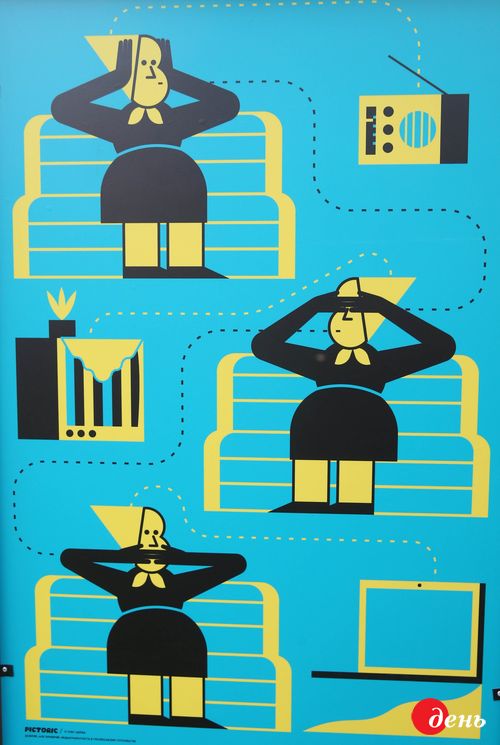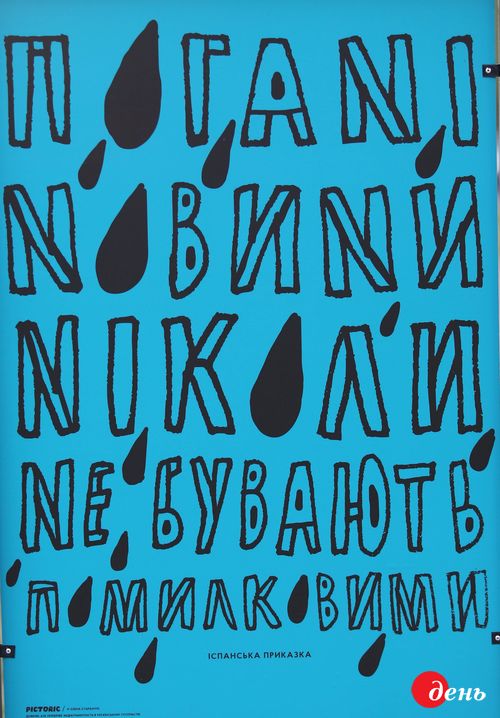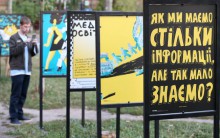“Truth and love will overcome lies and hatred” – this quotation from the prominent Czech public figure Vaclav Havel is placed next to his portrait on the memorial plaque on the wall of the Civil Registration Office in Kyiv’s Solomianskyi district. This building is at the beginning of a street named formerly after Ivan Lepse and now after Havel. Here, on a pedestrian strip between the traffic lanes, is an exhibit of posters, “Trust but Verify,” about media skills in Ukrainian society.
The idea is being implemented as part of the Transition Promotion Program under the auspices of the Czech Foreign Ministry and Ukraine’s Ministry of Information Policies. The Czech Ambassador to Ukraine, Radek Matula, who came to welcome the illustrators, said: “The Czech Republic has been helping Ukrainian media education organizations for several years. We were glad to support this uncommon and interesting project this year. It is especially gratifying that this event is taking place on the boulevard named after Vaclav Havel who is for us not only a president, a writer, and a statesman, but also a symbol of freedom, respect, and struggle.”

Fifteen artists, members of the Pictoric club of illustrators, took part in making the posters. This exhibit of multi-style works looks integrative and harmonious because of a common color palette. The 60 displayed posters can be divided, for convenience, into two parts. The first, textual, one consists of quotations from well-known writers and media skill researchers in the original language or in Ukrainian translation. The illustrators turned to folklore, expressing proverbs and saying by means of contemporary graphic symbols.
The second block is sketches on the production and usage of information. This has made different impressions on artists: some view the media as a projection of us and others as a puppet theater or a little paper boat in a stormy sea. Also illustrated are the main notions in this subject, such as propaganda, fake, censorship, media culture, etc. Some posters single out the key features of a media-skilled individual and emphasize the importance of a societal discourse. Nor have the authors forgotten about social websites, mostly focusing on such negative sides as excess of information, a limited angle, etc.

“Many posters here convey no concrete messages. We want visitors to ponder over these images and interpret them through the prism of their experience and imagination. Our goal is not to rank the media or spread the super-indispensable information but to prompt people to think independently and be aware of these problems,” Pictoric club co-curator Oleh Hryshchenko emphasizes. “There’s a lot of criticism in our posters, but we remind people that the media must carry truthful and quality information. One must spot the media that do so, trust, support, and help them shape themselves.”
Residents of the neighboring buildings, who stroll down the lane in the evening, stop in front of the posters, read the quotations, and photograph the images that have struck them the most. Children are bolder – they run their fingers across the posters, seeking a way out of the electronic labyrinth, laugh at the straight faces of puppet dictators, and keep asking their parents about censorship and propaganda.
People are one of the greatest sources of inspiration for Illia Uhnivenko, one of the illustrators. He makes sketches of certain situations on transport, in the streets, or in cafes, which he then uses in various projects, including the exhibit “Trust but Verify.” “It is difficult to look at this topic in a positive key,” Illia says. “It is sad to watch the news because of numerous fakes or speculations. To ward off as much informational pressing as possible, I stopped watching television as long ago as during the Maidan events, and I only read in social websites what I need or is interesting.” The people on Illia’s posters are totally different – they are surrounded by sources of information from all sides and feed their children with TV ersatz from an early age. But so many screens prevent them from seeing the real world with all its attractions and drawbacks.
The media skills exhibit will be followed up by a book in which posters will be accompanied with texts written on the same subject by well-known Ukrainian journalists.








